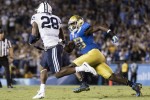Myles Jack never picked up his textbooks.
There they were, sitting in the campus store, the unenrolled linebacker’s name attached to books he’ll never read, things he’ll never learn.
Jack and I are kind of similar. I haven’t picked up my textbooks either.
The only difference between us – besides four inches, 100 pounds and a truckload of athleticism – is I plan to pick up my books.
Jack sure doesn’t. His books will return to the main shelves, the name removed, and some lucky kid will spend a quarter unknowingly reading Jack’s textbooks.
Or maybe they’ll be held for the next football player who takes those classes. Will he care more about his classes than Jack, who, according to Jim Mora, “doesn’t see any point in staying in school?”
Considering his torn meniscus, it makes sense that Jack saw no point in staying in school.
Oh wait, no it doesn’t. Sure, UCLA students have to walk more than Barry Bonds – Jack noted in an interview with NFL Media on Tuesday that it was hard for him to get to his classes – but isn’t receiving an education the “point” of staying in school? Of being a student-athlete?
The problem is that, in the environment of big-time college football, it’s not. The “point” is football.
For some players, like Jack, that’s fine. Come springtime, the man is going to get paid. Mora expressed concerns over Jack’s lack of game tape but will NFL teams really pass on such an athletic phenom?
Probably not. One NFC executive has already criticized Mora’s comments, saying Jack has enough tape and will go in the first round.
Last year’s first-round salaries ranged from a shade under $7 million for the 32nd pick to more than $22 million for the top spot. By setting school aside for the rest of the year, Jack will be able to focus on ensuring he gets closer to the $10 million given out to mid-first-round picks than the $7 million given to the last few picks of the round.
That’s a sizable difference, and Jack should do everything in his power to improve his draft stock. If that means dropping out of school and heading to Arizona to rehab with an NFL physical therapist, then that’s what he should do.
Jack is an exception, though – the rare college athlete who will benefit less from his education than from his athletic prowess.
Unlike Jack, most college players don’t have an NFL payday waiting for them. Unlike Jack, most college players will soon have to rely on their education. But for four years, they’ll focus first on football.
See, when Myles Jack doesn’t see any point in staying in school, it’s because he can’t play football anymore. That was always the point of staying in school. Sadly, it’s the same way for many of his teammates, even the ones without NFL futures. Playing in the environment of big-time college football makes it virtually inescapable. For better or worse, school will inevitably take a back seat.
I have no problem with the fact that Myles Jack unenrolled.
But he wasn’t the only player who hadn’t picked up his books.
Email Cummings at mbcummings@media.ucla.edu.
